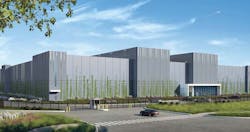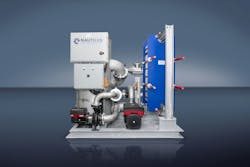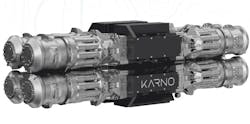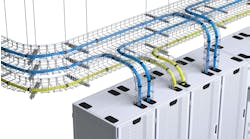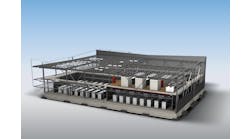Data Center Dynamics Debates Coalesce 2024 Industry Nuances, Views
At the recent Data Center Dynamics (DCD) Connect event in Leesburg, Virginia (Nov. 6-7), a series of debates were presented, each tackling some of the most pressing issues within the data center industry. The debates brought together industry experts and thought leaders to discuss, dissect, and sometimes challenge the strategies and technologies shaping the future of data centers.
The debate session deliberately unfolded under Chatham House Rules, which specify no direct quotes for media. What follows here then is a general summary of issues hashed over in each debate.
From Demolition to Liquid Cooling to Edge and AI
One of the earliest debates questioned the viability of data center demolition, asking whether tearing down existing facilities to make way for newer, more efficient ones was a bold move or a bad bet. Speakers from companies including Black Box, Exyte, and CloudHQ weighed in on the environmental and operational implications, considering whether the substantial investment in demolition could actually offer long-term benefits, or if it could ever rise to the level of a costly mistake.
In this recent video, Abhishek Bardhan from Exyte talks with DCD's Sebastian Moss about the key challenges for the future of data centers including chip design, power consumption, and cooling. Black Box was seen earlier this fall strengthening its data center solutions offering with the launch of its Arizona Hyperscale Center of Excellence and key leadership expansion. The company is a a global digital infrastructure integrator delivering network and system integration services and solutions, support services, and technology products, and particularly to hyperscalers. In terms of significant expansion, CloudHQ last month announced plans to build a 1.4 million SF data center on a 70-acre site north of Engler Boulevard and west of Clover Ridge Drive in Chaska, Minnesota.
The next debate, centered around a notional liquid cooling dilemma, explored whether embracing liquid cooling technology was an innovative step forward or, however unlikely, a risk that could lead to operational quandaries. Experts from Verizon, Digital Realty, and Nautilus Data Technologies discussed the potential of liquid cooling to address rising energy demands, while also highlighting the challenges of implementation and the possibility of unknowns surrounding its long-term reliability and viability.
Verizon just last week inked a deal for a massive renewal of its occupancy -- all 172K sq ft (SF) of it -- at the legendary NYC data center and interconnection hub, 60 Hudson Street (60H). DCF visited Digital Realty, one of the world's largest hyperscale and colocation operators and the largest by square feet, at its 60H facility last fall. Known for its floating data centers, Nautilus Data Technologies is now putting them up for sale, as seen in Stockton, Calif., the better to focus its prospects on modular data centers along with its newly unveiled EcoCore COOL platform, a data hall cooling distribution unit (CDU) designed for AI-driven data centers. Last June Nautilus announced it would build its next data center on dry land in Maine.
In another debate session at DCD Connect Virginia, the question of whether edge computing and AI could truly coexist in a way that delivers all the promised benefits of both technologies was examined. Industry leaders from Duos Edge AI, JLL, and Flexnode debated the practicalities of running AI at the edge, weighing the promise of faster, localized processing against the complexities of scaling such technologies across a distributed infrastructure.
Duos Edge AI this month announced it has acquired three additional edge data centers (EDC) to be deployed for Texas Economic Development, intended to provide low-latency, high-speed internet access tailored for remote districts in that state, directly addressing connectivity challenges faced by schools and public institutions. In its latest data center industry brief released on Nov. 20, commercial real estate titan JLL assessed that buyouts and mergers are fueling the data center boom, and that investors in the space remain busy on the hunt for data center deals amid the APAC region's supply crunch. This past summer, edge specialist Flexnode signed a LOI [letter of intent] with Hyliion for a strategic sustainability partnership hinged on micro data center powering via the supply of up to 10 KARNO generators. The additively manufactured KARNO generator is capable of operating on over twenty different fuels, including hydrogen, natural gas, propane, ammonia and conventional fuels.
Scoping Energy and Sustainability
Next at the DCD event, an engaging discussion along the data center energy storage frontier followed, regarding the future of diesel generators in data centers. The debate was arranged around the possibility of whether batteries as a sustainable alternative might just be a distraction from core purposes of immediate powering, and drew attention to the industry's avowed and growing interest in reducing reliance on fossil fuels. Experts from Datacenter Dynamics, notable 60H tenant Hudson Interxchange, and Arup forthrightly explored how battery storage could replace diesel backup systems, discussing both the technical feasibility and the cost-effectiveness of such a transition.
In a particularly critical debate, speakers next tackled the topic of sustainability programs, asking whether many of these initiatives were merely a form of greenwashing. Thought leaders from Akamai Technologies, Schneider Electric, and Canadian mega-colo eStruxture Data Centers dissected the growing skepticism around the industry's environmental claims, questioning whether the current efforts were enough, or if they were simply cosmetic measures designed to improve brand image without making a meaningful impact. Tough stuff.
Another debate drew lessons from the past, as experts discussed what mature industries had taught the data center sector about power management. Industry veterans from ENERCON, Google, and RPower reflected on the evolution of power infrastructure, comparing the strategies employed by other industries and examining how those lessons could be applied to enhance energy resilience in data centers.
Critical Infrastructure, Sustainability, and Nuclear Energy
As the conversation turned to critical infrastructure, a debate session raised the question of whether data centers should actively avoid being classified as such. Speakers from Uptime Institute, Brazil's Elea Data Centers, and the International Finance Corporation discussed the regulatory and operational burdens associated with critical infrastructure status, exploring whether it would be beneficial for data centers to remain outside of this classification.
The AI bubble came under scrutiny in another session, where the speakers asked the question, "Where are the sustainable business models?" Digital transformation and AI infrastructure experts from Digital Gravity, Apolo, and Digital Realty pondered the future of AI investments, questioning whether the current excitement surrounding AI was sustainable, or if it has led to inflated expectations. They further discussed how the sector could move past the hype and develop more viable, long-term business models.
A controversial topic was also broached in a debate about nuclear power, with speakers discussing whether recent advancements in nuclear energy could make it a viable solution for powering data centers. Experts from Aligned Data Centers, EdgeCloudLink (ECL), and HDR debated the potential of nuclear energy to provide a consistent and low-carbon power source, while also addressing concerns around safety, cost, and public perception.
Engineering and Construction Takes
Later on, the conversation shifted toward engineering and security management, with a session that questioned whether the industry was ready for a unified approach. Leaders from Datacenter Dynamics, Waterfall Security, and Vantage Data Centers explored the benefits and challenges of aligning engineering and security functions, emphasizing the need for a more integrated approach to ensure both the efficiency and safety of data center operations.
A particularly "hot" topic involved the topic of heat reuse in data centers, as the industry looks for ways to mitigate its environmental footprint. The debate questioned whether reusing the excess heat generated by data centers was a practical solution or an impractical idea. Speakers from Vantage Data Centers, Trane, and Penn State University discussed the technology's potential, looking at both the technical hurdles and the environmental benefits of implementing heat recovery systems.
Finally, the last debate of the series addressed the growing pressures on the construction side of the data center industry. As supply chain disruptions, workforce shortages, and public pushback may continue to strain data center development, experts discussed how these challenges could be tackled. Leaders from across the industry highlighted strategies for overcoming such obstacles, focusing on ways to streamline construction processes and supply chains while improving relationships with local communities.
Industry Nuances
Each debate at the annual DCD event in Virginia presented a nuanced look at the evolving landscape of data centers, reflecting the industry's need to adapt to technological advancements, environmental pressures, and operational challenges.
The diverse range of topics discussed underscored the complexity of the industry and the many factors that must be considered when planning for the future of data center infrastructure.
At Data Center Frontier, we not only talk the industry talk, we walk the industry walk. In that spirit, DCF Staff members may occasionally employ and humanize AI-assisted articles and content. This article was created with help from Open AI's GPT-4.
DCF Staff

Matt Vincent
A B2B technology journalist and editor with more than two decades of experience, Matt Vincent is Editor in Chief of Data Center Frontier.

